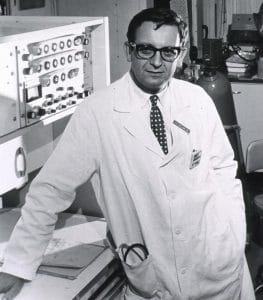Growing up, Holland’s father was a judge, and had heart disease, so he decided to become a doctor to help people with heart problems. He served as a captain in the U.S. Army Medical Corps from 1949 to 1951, and New York’s Presbyterian Hospital, which had offered him a position, rescinded the offer because Holland’s deployment was extended. Instead, he ended up at a new hospital that specialized in cancer treatment. Three months later, Presbyterian said it had an opening for him, “by then I had taken care of a child with acute leukemia and put her into remission,” he said, and decided to give up cardiology to try to cure cancer. At the time, 70 percent of children diagnosed with “ALL” (acute lymphoblastic leukemia) died within the first year. With such a short time span for treatment, Holland decided that trying one drug, waiting for the results, and then trying another, was destined to fail — and it did. Instead, he tried multiple treatments at once: a combination drug therapy designed to overwhelm the cancer. Experts had long considered cancer “incurable,” and experimenting with drug therapies was considered part of the medical “lunatic fringe,” but Holland pressed on, even while acknowledging that his treatment regimen, dubbed “combination chemotherapy,” had significant side-effects and discomfort. “If you do no harm,” he said later, “then you do no harm to the cancer either. I’m interested in the curability of these diseases.”

Holland’s regimen, as refined over the years, worked: now, more than 80 percent of children diagnosed with ALL live, and his methods were adapted to other cancers. “He was one of the great pioneers of the field in its early days,” says oncologist Vincent DeVita Jr., who adapted Holland’s treatments for Hodgkin’s lymphoma. “People thought the concept of drugs curing cancer was beyond sanity,” and “the idea of using drugs in combination was even crazier.” But Holland proved it worked. “We were looked on as cowboys,” Holland said later, “but we could point to remissions, which other people didn’t have.” He went on to work on other types of cancers, and is “one of the founding fathers of cancer chemotherapy,” DeVita says. “I find the expanse of it challenging,” Holland said. “Once you’re in it, the only thing is to seek prevention and cure. Not to hold people’s hands and help them die gracefully.” Dr. Holland died at his Scarsdale, N.Y., home on March 22 at 92 — from heart disease.
